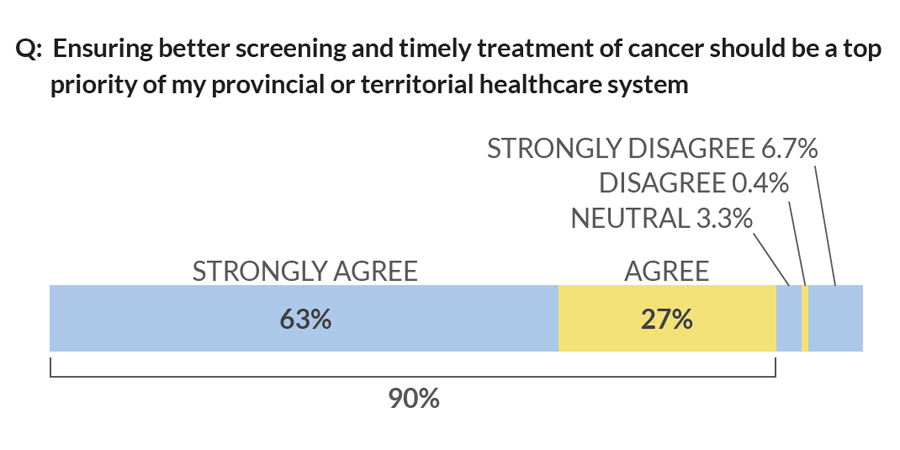Health System Must do More for Cancer Patients

SPECIAL EDUCATIONAL FEATURE
- While many get good care, a new CARP survey shows some Canadians fall through the gaps
- Less than half believe the public health system is well equipped and treats cancer effectively
- 90% say cancer should be the top priority of the public health system and new government investments are needed to prepare the system for growth in cancer cases
Almost every Canadian has been affected by cancer in some way – either by having the disease themselves or by having friends or loved ones afflicted.
This is why CARP decided to survey its members to find out about their experiences with cancer, how it is treated in Canada’s medical system and their perspectives on health system priorities and investments. The results will allow CARP to discuss with governments what they are doing right and how they need to improve so that Canadians with cancer in the future get better care.
A key finding of the survey was that more than nine out of 10 (91%) say Canada’s public health systems need to make new investments so they can be better prepared to treat cancer. Another large majority, 90%, believe cancer should be the top priority of their public health system. On the issue of funding, one respondent noted that “cutbacks and/or no new funding will and does hinder the future of our healthcare system which we are blessed to have.” Another respondent spoke to the urgency for governments to address this issue and that “they need to prepare now!”

With an aging of population and rising rates of cancer, which the Canadian Cancer Society says will strike one of every two Canadians, more than half (52%) of respondents to the survey said their public health system is not ready to face the onslaught.
While the survey garnered many positive stories of cancer patients receiving good and timely care and treatment, almost one in four respondents said patients are not receiving optimal care. Less than half believe the public health system is well equipped and treats cancer efficiently.
CARP’s cancer survey was available on CARP’s website from January 23 to February 13, 2019. The survey attracted nearly 4,000 respondents from every province. About half the respondents had themselves received a cancer diagnosis at some time. This figure is consistent with the Canadian Cancer Society statistic that one out of every two Canadians can expect to get cancer in their lifetime.
Learn more about this topic and how to get engaged to improve cancer care by tuning into our ZoomerMedia Panel that will take place in September. Details to follow shortly.
Other results from the national cancer survey of 4,000 CARP members

Low awareness levels for cancer statistics
Survey participants were also asked questions about their knowledge of key cancer statistics. Results indicated that participants underestimated the extent and impact of cancer:
- Only 13% correctly identified lung cancer as the most diagnosed cancer in Canada and just one in four correctly said lung cancer is the leading cause of cancer deaths
- Only 14% correctly said cancer is the leading cause of death in Canada
- Just 19% of respondents correctly answered that one out of every two Canadians can expect to get cancer in their lifetime. Almost half thought it was one in five
- Only 3% said correctly an 80% increase in cancer cases is expected from 2003 to 2028. Most expected the increase would be much lower
However, on several other cancer-related questions, respondents fared much better. Half correctly said the new type of cancer treatment called immunotherapy refers to, “A drug that harnesses the body’s own immune system to detect and kill the cancer cells.”
Almost all respondents knew that melanoma is a type of skin cancer and are familiar with surgery, chemotherapy and radiation as types of cancer treatments.
Respondents expressed an interest in learning more about cancer, with one person saying that they are “look[ing] forward to seeing more surveys emphasizing the importance of knowledge.”
“Wow, I thought I knew the answers to the first set of questions but only got one right! Seems we need more exposure to stats.”

Almost half of cancer patients wait more than a month to get treatments started
The wait time for treatment was concerning. “Cancer is very scary,” according to one respondent, who believes that “no one once diagnosed should have to wait even a day for treatment.”
“It’s the wait time and not knowing what options you have because of the wait time that wears a family down.”

Canadian cancer patients generally enthusiastic about clinical trials
Clinical trials are an important part of the development of new treatments, including those for cancer. Because they are usually financed by the company that is developing the new treatment, they allow patients who qualify to access new therapies, usually without charge and before they are more widely available.
Four out of five CARP members in the survey said they would agree to participating in a clinical trial. Of the respondents who said they had already participated in a clinical trial, most said it was a positive experience.